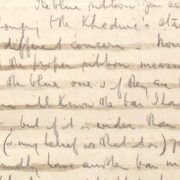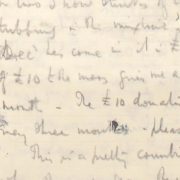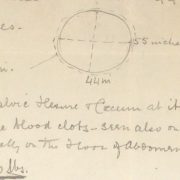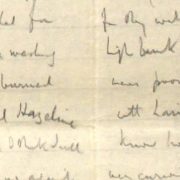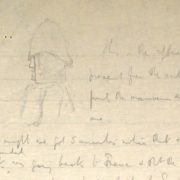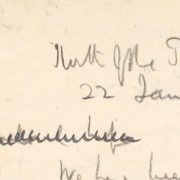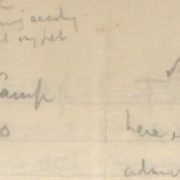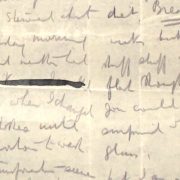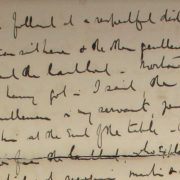3 – Letter to Mary Ann Smith from Frederick Smith, 24 Dec 1899
The copyright of this material belongs to the Royal College of Veterinary Surgeons. It is available for reuse under a Creative Commons, Attribution, Non-commercial license.
Click here for full transcript of letter
[FS/2/2/4/2/3] (1)
In front of Colenso
24′ December 1899
[Salutation Redacted]
[[1]] My letter to you this week will describe our journey from Durban to this place, it would have formed the subject of last week’s letter only more important matters cropped up. We landed at Durban at night & for the first time for many days saw the faces of white women who crowded around in spite of the rain to watch proceedings. The place was under martial law <with> no one allowed out at night after 11 O’clock & everything looked very warlike soldiers & sailors alike being armed to the teeth. In the early morning we loaded up & left Durban in seven trains amid the greatest enthusiasm, people crowded around[,] women were there providing the men with writing material & stamps, food & fruit[,] everything in fact done for the soldiers convenience which they heartily appreciated. Every station we stopped
[[2]] at 30 miles from Durban there were women & girls on the platforms, supplying the men with tea, water[,] fruit & food, the enthusiasm was intense the cheering tremendous, one very pretty girl did me the honour of kissing her hand so excit[sic] to me so great was her excitement.
In this way we reached Maritzburg & here again the women pressed forward doing all they could for the men, taking charge of their letters & looking after them like sisters. They were splendid women all done without any expectation of remuneration everything free, all they asked for were the badges the men wore in their helmets with the number of the regiment on. After leaving Maritzburg it soon got dark & we arrived at Mooi River at 3am to learn that 300 Boers were in the vicinity, our camp was 11/2 miles from the station, an armoured train was waiting with steam up & we expected a row, but none came,
[[3]] in the pitch dark night (which thanks to my lamp was no trouble to me) I determined to bed down in the station & wait for daylight. I did so <and> found a corner & bedded down Morton also. He snored & slept soundly, I got a rest but no sleep. Next morning I went up to our Camp where we remained three days. It was at this place the Boers opened fire only the week before, a tin hut on a hill near (strange to say occupied by a colonial V.S[1] & his wife) was a sight, they had evidently cleared out in a hurry, the bed on the floor was made on it was lying a hat without trimming a veil & petticoat, on the wall was a faded ball dress body & skirt & behind the door a cloak. The other room was full of drugs instruments & appliances[,] everything deserted. I wish I had had a camera the place defies description. The Boers were reported all round so we kept piquets out day & night
[[4]] I wish I had Our train experiences as far as Mooi River were very trying the line runs up & down hill there are no tunnels the rail winds round the hills runs at the edge of precipices that make you sick to look on, the carriages shaky & rotten (though I believe they have good ones) the horses fell down some even fell out at every station we had to get one or more up which meant unloading the whole truck & altogether I was very glad when Mooi River was reached[.]
The camp was a good one but Egypt could not beat it for flies, ones tent was black with them myriads. It was here I was able to demonstrate my usefulness as D.V.O!! Glanders had broken out in the Scottish Rifles & the whole of their Transport (57 animals) were isolated & no good to the Rgt. A Colonial V.S was in charge & as Matthews is shut up in Ladysmith with 14 other A.V.O men the work was being done by Crawford. No attempt had been made to Mallein the remainder & at Mooi River
[FS/2/2/4/2/3] (2)
[[1]] they would have remained indefinitely but for me. I wired Crawford, got the Mallein, inoculated half the number found them free from disease & they were sent on & in time for the battle [of] Colenso!! There was an officer of the S. Rifle charge & he was so pleased at being liberated & getting up to the battle that he lent me a mule which I now have & which is going to carry my kit in the future — Crawford finally came up & I saw him just before we marched from Mooi — I did not know him not having seen him for 22 years. He is a nice quiet fellow, before we parted I gave him the copy of a wire to you to be sent after the fight on hearing from me. I hope you got it.
We marched from Mooi River by easy stages to Esctcourt & thence to here we met the Royals at Frere & with them was Gladstone. I cannot remember having met him before[.] He is very Scotch. The Royals lost more horses coming out then we did.
[[2]] The fight here I gave you a description of last week so I have now brought myself up to date[.]
25th Dec. A merry Xmas to the children, it would be affectation to wish you the same with your husband on Service [2 lines redacted].
It is a boiling hot day. I have to sit in my tent with my helmet on owing to the heat coming through the tent. I got my Xmas box however [words redacted], it was a letter from you [2 words redacted] enclosing the ribbon bar. That reminds me that I have not yet mentioned the decoration to you. I took the news quietly but in my heart of hearts I am most delighted — I at once wrote to Sir E.W.[2] & poured out my thanks. I feel amply recompensed for my labours — You are wrong [2 words redacted] over the ribbon, until you know exactly what the decoration is you cannot
[[3]] determine the colour of the ribbon, it may be a Medjidie or Osmanieh & of these there are five classes each[3]. The ribbon will I expect will be green with red edge or red with green edge — You can get it at Hawkers when you know exactly what to ask for & this you will know from the Gazette, it will be published in the London Gazette — Mind you let Lea[4] know.
The blue ribbon you sent is that belonging to the Khedive’s star a totally different concern. Now when you get the proper ribbon measure it against the blue one & if they are the same size you will know the bar I have is alright, but if it is wider than the blue ribbon (& my belief is that it is) you will then kindly have another bar made for me. Oh, I am so delighted about it. [2 lines redacted]
[[4]] [1 line redacted] What years I have wanted for these, & now I get three in about 12 months. The permission of the S. of State is a mere formality. Sir Wood ascertained before hand[sic] that no refusal would be offered.
There are two fellows of the 21st Lancers in the 13 Hussars & they both remarked when I told them of my luck that it was strange & a curious coincidence that the conferring of the decoration should have co–incided[sic] with Blenkinsop’s absence from Egypt. I dont[sic] say much, but I think a lot about it.
[10 lines redacted]
[FS/2/2/4/2/3] (3)
[[1]] Your Xmas day I know will be miserable & if [5 lines redacted]
I shall be glad to know you have secured the refusal of that house or some other equally moderate & convenient. You will not forget that my expenses in this country both during & especially after the war will be very heavy I only get English pay with 1/6 per diem colonial allowance my pay at £1 per diem with the above equals 21/6 per diem or £32-5 a month, out of which I give you £20 leaving me £12/5 a month to live on[,] less than I had the first day I joined the Service, [4 lines redacted].
[[2]] This Regt will prove very expensive they drink a lot of Champagne & propose to divide the cost!! Nice for me — Keep a careful eye on the pence the pounds will take care of themselves.
Now a little about our position here & our prospects. We are 5 miles from the enemy & have been here ever since the day after the battle. We do nothing but sit tight, no one has the slightest confidence in the Generals, they are condemned in the most open manner by everyone. We send out patrols by day & picquets by night. One patrol the other day was fired on & two men killed & 7 horses, there is no doubt the men were lying down asleep at the time, it is difficult to impress them with the idea that they are on service & not in the long valley[5] — One of the men killed was a Reservist, his wife had a baby three days before we sailed, her Xmas will be a sad one[.]
[[3]] One man had two, the other seven bullets in him. The Boers are all around even close up to our camp, they captured two officers yesterday in broad daylight both belonged to a Colonial corps, they are so emboldened by success that they are capable of doing anything — In return we do positively nothing. I have suggested night attacks ambushes etc but everyone in authority seems afraid to move its[sic] positively sickening. The only people anxious for reprisals are the younger element, I would put all young men into the place of our Generals.
You can fancy our position when I tell you we cannot send our horses to water without the men taking carbines & ammunition.
The Boers of course will nor attack us in force, that is not their game, we would be glad if they would, it would draw them out of their rifle pits into the open
[[4]] & there we could deal with them, their plan is to harrass (I cannot spell the word) us & get around our flank & so cut us off like Ladysmith. Still feel no alarm, if we get them in the open we can crush them. We have some good naval guns, they fire on them every day[sic] & you can imagine what they are like when I tell you they hit the mark at five miles. The Boers are very angry with the sailors in consequence & threaten to crucify the first they catch.
Our camp is very dusty & full of scorpions, dozens are killed everyday big black ones. We get plenty to eat & bread not biscuit. The water is bad & very scarce. I have plenty to do go all around is the morning early & then do the Regt. The afternoons are
[FS/2/2/4/2/3] (4)
[[1]] very hot, but we may look for cooler weather in a month or so.
I have a very nice horse from the Remounts nearly an Arab. Col. Stevenson of our Remt Dept was in Durban when we landed & he sent me a horse up[,] he did me well being in the show. I have it on the hire system £10 per annum which is a great pull. Besides this I have the mule & I hope to commandeer a Boer pony if we have any luck in dealing with them.
To day[sic] being Xmas day we let them off a bombardment, ‘peace & good will’ I suppose nor have we heard them bombarding Ladysmith. I do not know what to morrow[sic] will bring forth but I expect they will get their Xmas box from our 47 guns. We have a nice meeting to morrow[sic] & hoped to have invited the Boers over for it, but the latter idea fell through, you see we are both Protestant races. In spite of everything we are perfectly cheery
[[2]] if it were not for the guns & the fact that every–one[sic] is armed to the teeth you might imagine we were on peace manoeuvres.
Every day Boer spies are captured & sent through here south. I saw some Boer prisoners the other morning, only one was white, the others were niggers.
This afternoon a very interesting person turned up young Churchill. You will remember he was captured in the armoured train fight when we were on the high seas. He managed to escape from Pretoria & to day[sic] he told us all about it. It took him 9 days to reach Delagoa Bay, he had no money no food excepting what he stole, hid by day & jumped into the passing train by night.
For 60 hours he remained under some sacks in a railway waggon without food & water he wished himself at the time back in Pretoria, they reached the waggon as they
[[3]] were looking for him, but he was near the bottom & escaped detection!! When he got to Delagoa he went by ship to Durban & is once more on the scene[.] He is a fine plucky fellow, the wound in his head was slight & has healed but he looked very pale. He did not escape in womans[sic] clothes as reported. He says that so certain are the Boers of capturing Ladysmith that they have prepared a camp for the reception of White’s force — Every inch of the coast between Colenso & Ladysmith is difficult & full of rifle pits. There are 7 miles of wire entanglement around Colenso & full of mines. A pleasant prospect. Buller will do well to avoid a direct attack, he ought to cross the Tugela higher up & get around their flank.
I am writing this by night after quite
[[4]] an excellent Xmas dinner including a lovely plum pudding sent [to] the Colonel from home with [1 word illeg.] steak & turkey! from Maritzburg. While I am writing the “Scalliwag” continued as we call the Colonial forces are singing & cheering
themselves horse hoarse — Some of these men are the refuse of the Transvaal they steal whatever they can find ones horses and kit go in a remarkable manner.
One forse was raised by Byng of the 10th Hussars. He is known by his Regt as “Bungo” & his men are known to us as Bungo’s Burglers[sic]!! another force is Thornycrofts “Thieves” Another useful force are the “Body Snatchers” viz the men who pick up the wounded & dead. Altogether we are not dull nor wanting in spirits all we want is to meet the enemy in the open.
I am now sleeping on a hospital stretcher
[FS/2/2/4/2/3] (5)
[[1]] placed on two medicine chests – quite comfy; on it is my valise, on the top of the valise is my kit & things including kettle tin pot se. I sometimes in the night find something hard under the small of my back, on examination it turns out to be a nail brush, or my knife or kettle or something equally soft, but it all comes in the days work.
My candle would amuse you, they all melted into one mass & they had to be cut apart, they are twisted & flat like tape, but they burn quite well in the neck of a beer bottle, though very drunken & distorted from the perpendicular[.]
Please send me one pound of tobacco a month, difficult to get, here, while on service we pay no duty. I think a pound is what I smoke, but you will know best. I smoke the pipe those beloved children bought me from Earls Court
[[2]] [14 lines redacted]
I am not surprise to hear about Ingram your brother always had a difficulty in getting money out of him. I should not be surprised if your aunt is left a poor woman after all — He may have made away with everything — I am most anxious for further news on this point. It is a very serious matter.
Willoughby House[?] affairs seem in a bad way incompatibility of temper [2 lines redacted]
[[3]] [3 lines redacted]
Jarvis last night said he did not suppose it was much use hanging his stocking up as he would only find a scorpion in it in the morning. Strange to say he found one in his bed so his fore cast was verified.
[14 lines redacted]
[[4]] we know each day we are safe, whereas you have no idea what has happened or is happening. But cheer up old girl all will be well[.]
Morton amuses me, he does nothing but sleep all day & all night, but he is an excellent chap & I am very glad I brought him. He has had no letter from home since he left.
It is a good thing young Hayduff[?] has left home[,] he is very late in joining the service but I hope he may do well. [4 lines redacted]
Tell the former to send me a letter which you can enclose with yours telling me everything about the children & their education & all the news she can think of — I know she is fond of writing — I will now go to bed & write you more to morrow[sic].
[2 lines redacted]
[FS/2/2/4/2/3] (6)
[[1]] 26 Dec. The Boers got their Xmas Box very early this morning. I was awoke about 5am with the thunder of cannon & 40 Lyddite shells were thrown with their work before 7 am. I went up to the Battery & on the way met Churchill, I was able to introduce him to Commander Limpus[6] of the “Terrible” who is my pal up there. Everyone is anxious to meet Churchill after his exciting adventure. The latter told me Ladysmith cannot hold out after the 15th January, its fate will be settled before you get this letter & being a pessimist I think it will be against us. The Boers in anticipation have prepared near Pretoria a large [1 word illeg.] for the reception of the prisoners!! Further all their trains from Pretoria are labelled Durban! I have this on the authority of Churchill.
[2 lines redacted]
Poor Lucy I am so grieved, do write & give my love & best wishes.
[[2]] I am glad you had a mild november[sic] & hope it will last throughout the season.
The ‘Morning Posts’ you sent me are excellent & although abundant picture papers have come out to the men, your Morning Posts are in great requisition
[1 word illeg.] will be Gazetted in Adams place until the war is over & then it will be [5 lines redacted]
I regret to say I did not remember our 20th wedding day, but that was not due to thoughtless or neglect, dates as you know do not impress me I never thought of it in the midst of my work which you know on the ship was very heavy. — [1 line redacted]
I doubt if you would know me if we met burnt red & brown, dirty clothes ( a plate of soup was spilt down my Khaki jacket
[[3]] & left a lovely grease stain) Everything dirty — I am sure I am not recognisable & that is after 3 weeks what will I be like at the end of 3 months.
I knew Mercer years ago when he was a subaltern. Is Stanford still next door or has he started for S. Africa? [4 lines redacted]
[4 words illeg.] I have now answered all the points in your letters. [4 lines redacted]. Had we won the battle of Colenso you would have had only a bare line for we would have been [2 words struck through, illeg.] day by day — The mail goes on Thursday, but to make sure I will post this to morrow[sic] as our postal arrangements are not of the best & trains break down far too frequently.
[[4]] Dont[sic] believe all the tales you hear of Boer butchery — they treat our prisoners & wounded very well & we do the same to theirs. At the Colenso show they gave our men water etc & some of them gave money to the wounded. Today something is on, some of our troops have gone back to Frere & a flank movement is on the cards. We may be left at Colenso to mark the movement higher up, but cannot say. I will write every week that is possible, but again remember no news is good news
[10 lines redacted]
[Valediction Redacted]
(Please note that work on this transcript is ongoing. Users are advised to study the electronic images of this document where possible – https://vethistory.rcvsknowledge.org//archive-collection/fs-working-papers/)
[1] V.S – Veterinary Surgeon
[2] Field Marshal Sir Evelyn Wood (1838-1919)
[3] Military decorations of the Ottoman Empire
[4] Arthur Sheridan Lea, physiologist (1853-1915)
[5] The Long Valley at Aldershot
[6] Admiral Arthur Henry Limpus (7 June 1863 – 3 November 1931) was a Royal Navy officer

